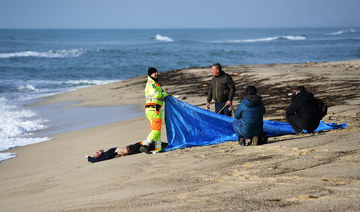STECCATO DI CUTRO, Italy: “Italy here we come!” cheered the young men, in Urdu and Pashto, as they filmed themselves standing on a boat sailing in bright blue waters.
They were among around 180 migrants — Afghans, Pakistanis, Syrians, Iranians, Palestinians, Somalis and others — who left Turkey hoping for a better, or simply safer, life in Europe.
Days later, dozens of them were dead. So far, 70 bodies have been recovered from the Feb. 26 shipwreck near the small beach town of Steccato di Cutro, but only 80 survivors have been found, indicating that the death toll was higher. On Sunday, firefighter divers spotted a further body in the Ionian Sea and were working to bring it ashore, state TV said.
The tragedy has highlighted the lesser-known migration route from Turkey to Italy. It also brought into focus hardening Italian and European migration policies, which have since 2015 shifted away from search and rescue, prioritizing instead border surveillance. Questions are also being asked of the Italian government about why the coast guard wasn’t deployed until it was too late.
Based on court documents, testimony from survivors and relatives and statements by authorities, the AP has reconstructed what is known of the events that led to the shipwreck and the questions left unanswered.
___
THE FATEFUL JOURNEY
In the early hours of Wednesday, Feb. 22, the migrants — including dozens of families with small children — boarded a leisure boat on a beach near Izmir following a truck journey from Istanbul and a forest crossing by foot.
They set out from the shore. But just three hours into their voyage, the vessel suffered an engine failure. Still in high seas, an old wooden gulet — a traditional Turkish style of boat — arrived as a replacement.
The smugglers and their assistants told the migrants to hide below deck as they continued on their journey west. Without life vests or seats, they crammed on the floor, going out for air, or to relieve themselves, only briefly. Survivors said the second boat also had engine problems, stopping several times along the way.
Three days later, on Saturday, Feb. 25, at 10:26 p.m. a European Union Border and Coast Guard plane patrolling the Ionian sea spotted a boat heading toward the Italian coast. The agency, known as Frontex, said the vessel “showed no signs of distress" and was navigating at 6 knots, with “good” buoyancy.
Frontex sent an email to Italian authorities at 11:03 p.m. reporting one person on the upper deck and possibly more people below, detected by thermal cameras. No lifejackets could be seen. The email also mentioned that a satellite phone call had been made from the boat to Turkey.
In response to the Frontex sighting, the case was classified as an “activity of the maritime police”. Italy's Guardia di Finanza, or financial police, which also has a border and customs role, dispatched two patrols to “intercept the vessel."
As the Turkish boat approached Italy’s Calabrian coast on Saturday evening, some of the migrants on the boat were allowed to message family, to inform them of their imminent arrival and release the 8,000-euro fee that had been agreed upon with the smugglers.
The men navigating the boat told the anxious passengers they needed to wait a few more hours for disembarkation, to avoid getting caught, according to survivors’ testimony to investigators.
At 3:48 a.m. on Sunday, Feb. 26, the financial police vessels returned to base, without having reached the boat due to bad weather. The police contacted the coast guard to ask if they had any vessels out at sea “in case there was a critical situation” according to communication obtained by the Italian ANSA agency and confirmed by AP. The coast guard replied they did not. “OK, it was just to inform you,” a police officer said before hanging up.
Just minutes later, at around 4 a.m., local fishermen on Italy's southern coast spotted lights in the darkness. People were waving their cell phone flashlights desperately from atop a boat stuck on a sand bank.
The suspected smugglers grabbed black tubes, possibly life jackets, and jumped into the water to save themselves, according to survivors. Waves continued smashing into the vessel until it suddenly ripped apart. The sound was similar to that of an explosion, survivors said. People fell into the frigid water, trying to grab onto anything they could. Many could not swim.
Italian police arrived on the scene at 4:30 a.m., the same time that the coast guard says it received the first emergency calls related to the boat. It took the coast guard another hour to get there. By then, bodies were already being pulled out of the water with people screaming for help while others attempted to resuscitate the victims.
___
THE YOUNG VICTIMS
There were dozens of young children on board the boat. Almost none survived. The body of a 3-year-old was recovered Saturday.
Among those who lived was a Syrian father and his eldest child, but his wife and three other children did not. The body of his youngest, age 5, was still missing four days later.
One Afghan man drove down from Germany, searching for his 15-year-old nephew who had contacted family saying he was in Italy. But the boy also died before setting foot on land.
The uncle asked that his name, and that of his nephew not be published as he had yet to inform the boy's father.
The baby-faced teenager had shared a video with his family during his sea voyage, with apparently good weather.
His mother had died two years ago, and with the return of the Taliban to power, the family fled to Iran. The boy later continued to Turkey from where he tried multiple times to cross into the EU.
“Europe is the only place where at least you can be respected as a human being,” he said. "Everyone knows that it is 100% dangerous, but they gamble with their lives because they know if they make it they might be able to live.”

A relative cries on the coffin of one of the victims of last Sunday's shipwreck at the local sports hall in Crotone, southern Italy, Wednesday, March 1, 2023. (Photo courtesy: AP)
___
THE AFTERMATH
Prosecutors have launched two investigations — one into the suspected smugglers and another looking at whether there were delays by Italian authorities in responding to the migrant boat.
A Turkish man and two Pakistani men, among the 80 survivors, have been detained, suspected of being smugglers or their accomplices. A fourth suspect, a Turkish national, is on the run.
Particular attention has been focused on why the coast guard was never sent to check on the boat.
A day after the shipwreck, Frontex told AP it had spotted a “heavily overcrowded” boat and reported it to Italian authorities. In a second statement, though, Frontex clarified that only one person had been visible on deck but that its thermal cameras — “and other signs” — indicated there could be more people below.
In an interview with AP, retired coast guard admiral Vittorio Alessandro said the coast guard’s boats are made to withstand rough seas and that they should have gone out. “If not to rescue, at least to check whether the boat needed any assistance.”
Alessandro added that the photos released by Frontex showed the water level was high, suggesting the boat was heavy.
The coast guard said Frontex alerted Italian authorities in charge of “law enforcement,” copying the Italian Coast Guard “for their awareness” only. Frontex said it is up to national authorities to classify events as search and rescue.
“The issue is simple in its tragic nature: No emergency communication from Frontex reached our authorities. We were not warned that this boat was in danger of sinking,” Italian Premier Giorgia Meloni said on Saturday.
“I wonder if there is anyone in this nation who honestly believes that the government deliberately let over 60 people die, including some children,” she added.
Alessandro, however, lamented how over the years the coast guard’s activities — which previously occurred even far out in international waters — have been progressively curtailed by successive governments.
“Rescue operations at sea should not be replaced by police operations. Rescue must prevail,” he said.
In an interview with AP, Eugenio Ambrosi, chief of staff at the U.N.’s International Organization for Migration, stressed the need for a more proactive search and rescue strategy, on a European level.
“We can look and debate whether the (boat) was spotted, not spotted, whether the authorities were called and didn’t respond,” he said. “But we wouldn’t be asking this question if there was a mechanism of search and rescue in the Mediterranean.”


















